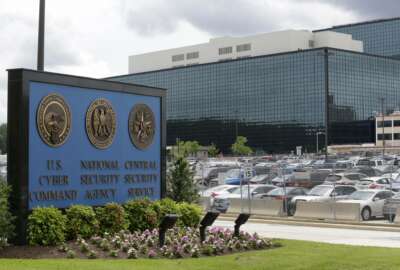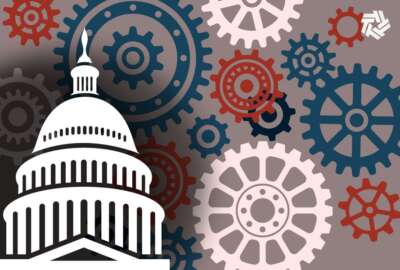Hubbard Radio Washington DC, LLC. All rights reserved. This website is not intended for users located within the European Economic Area.
On Air: Federal News Network
Trending:
New DoJ training reinforces the shared responsibility of FOIA
Melanie Pustay, the director of the Office of Information Policy in the Justice Department, said the tools and e-learning modules are focused on everyone from n...
wfedstaff | April 18, 2015 3:07 am
The Justice Department wants every federal employee to understand their role when it comes to the Freedom of Information Act.
So as Sunshine Week is set to begin March 16, DoJ is reinforcing that concept through a set of new tools and training.
Melanie Pustay, the director of the Office of Information Policy in the Justice Department, said the new education courses are aimed at every level of federal employee from newly hired to senior executives and political appointees.
Pustay said DoJ’s goal is to emphasize the fact that FOIA is everyone’s responsibility.
“We wanted to work on developing a suite of e-learning training modules that could be available to anyone across the country, at any time day or night,” Pustay said in an interview with Federal News Radio. “From the new employee walking in the door to a senior executive, everybody has a role to play in FOIA, and we thought it was important to reach all those different audiences.”
DoJ rolled out the tools and training Thursday during a workshop in Washington, and ahead of the 10th annual Sunshine Week, which highlights open government efforts and continued challenges. Sunshine Week kicks off March 16 with an assortment of events in and around government.
Pustay said Justice has been focusing on FOIA and open records for much of the last six years, highlighted by the White House’s Second Annual Open Government National Action Plan and former Attorney General Eric Holder’s 2009 FOIA guidelines.
Backlog rising
But despite these focus areas, agencies continue to struggle in meeting the Obama administration’s open government goals.
A recent report from the Center for Effective Government found 10 of 15 agencies, which account for 90 percent of all FOIA requests, received low grades for meeting the spirit and intent of the 50-year-old law.
The Obama administration saw some initial progress around FOIA, specifically reducing the backlog and time it takes to process requests. But over the last year, the ability of agencies to process FOIAs has been tested. According to FOIA.gov, as of fiscal 2013, the backlog of requests stood at more than 95,000, up from more than 71,000 in 2012. Still, the backlog of requests is down from a high of more than 130,000 in 2008.
Pustay said she hadn’t read the latest report from the Center for Effective Government in depth, but there are real reasons why FOIA remains a challenge for many agencies.
“This past year agencies faced a lot of challenges. We had the government shutdown, which was almost three weeks of time lost literally with the shutdown, and lots of additional time lost in connection with it,” she said. “Many agencies have faced budgetary cuts and so have had decreased staff to deal with FOIA, and as much as we’ve been trying to focus on using technology to help with FOIA, at the end of the day you need people to review records for disclosability. So loss of staff has a big impact.”
Additionally, agencies say FOIA requests are getting more complicated as departments release information more readily. Justice reported agencies received more than 704,000 FOIA requests in 2013, up from 651,000 in 2012 and up from 557,000 in 2009.
Pustay said agencies are not getting the simple requests anymore because of the goal of default to openness the administration put in front of the government.
“At the Department of Justice, we’ve maintained a really high release rate. For the past six years, we’ve had a release rate of over 93 percent, meaning that the public is getting, for the requests where we process records for disclosure, 93 percent of them are either released in full or released in part. That’s an area where we are real happy to see the presumption of openness playing out,” she said. “Other things agencies are doing, not just DoJ, but lots of agencies is increasing proactive disclosures so there’s lots of examples of things being disclosed without the need for a request. Agencies also are making discretionary releases of documents or information that they could have protected under an exemption, but they are choosing not to as a matter of discretion. There are lots of good things that are still happening in FOIA despite the challenges agencies face pragmatically.”
Many request assistance
Even with all this focus over the last six years, agencies are asking Justice for more help.
Pustay said that’s why her office developed these new tools and online training.
“As part of our work on this initiative, we met with agency representatives and with requestor community groups and civil society organizations, and we factored in their feedback with all of these training tools,” she said. “One of suggestions we got from agency employees was ‘Please help us spread the word to the non-FOIA professionals that we need their help and we need them to respond timely to us.’ So that was specifically a request we got from agencies and so we made sure we had that in the modules that go to the everyday employee.”
Pustay said every new employee will receive a one-page explanation of what is FOIA and why it matters in their “welcome” package.
The document highlights the Who, What, When, Why and How questions about FOIA and key statistics.
Another training module is for current federal employees whose everyday job doesn’t focus on information requests.
“We want them to realize there is a time limit to respond to requests and that their FOIA professionals need them to help in identifying records or reviewing records,” Pustay said. “We also want them to understand the importance of customer service in responding to FOIA and really the purpose behind the law and the very noble goals the FOIA is designed to promote.”
For FOIA officers and others whose job is to respond to these requests, DoJ developed a 3 1/2 hour online module. Pustay said the goal is for these professionals to understand all aspects of the process, including the lawful exemptions, the importance of good customer service and other significant facets of FOIA.
“The idea is not to sit and listen to for 3 1/2 hours and be done. It’s an e-learning module,” she said. “It was built in conjunction with e-learning experts within DoJ, who helped us to understand how best to present the material so that it’s enjoyable to listen to and that it’s fun. We have knowledge checks built in and we have a skills lab so you are interacting with the material to help embed the principles.”
Standardized regulations coming
The fourth and final audience for these tools and training is senior executives and political appointees. Pustay said ensuring these executives support the FOIA process and the presumption of openness is important to the entire process.
“For that audience, we did a video that is 9 minutes. I worked very hard to keep it under 10 minutes so that it’s a short amount of seat time for a senior level official because, obviously, they have more limited time to spend on this, but we wanted to capture the key things that are important for a senior person to know,” Pustay said. “The number one thing is how important their support of their agency’s FOIA program was, how their FOIA professionals needed them to be supportive of their work and to help with things like identifying proactive disclosures and being mindful of resource issues that come up. We also wanted to make sure that the senior level officials understood there is accountability for FOIA and there is reporting that is done every year.”
After Sunshine Week has set, Pustay said Justice will continue to emphasize the concept of shared responsibility for meeting the spirit and intent of FOIA through the annual reporting requirements agencies have to her agency.
At the same time, Pustay is leading a wide-ranging effort to rework and standardize the FOIA regulations across government as one of five goals under the national action plan.
“It’s a heavy lift with lots of different viewpoints to reconcile,” she said. “Our goal is to get something out by the end of the calendar year. What we are working on now is coming up with consensus views on the content of something that would be common.”
Pustay said she wasn’t yet about the process to get new regulations out whether they’d come out as a proposed rule or how.
RELATED STORIES:
Agencies opening up slowly under FOIA mandate
Agencies fail to make the grade on FOIA requests
Group sites DoJ FOIA policy as reason for anti-transparency award
Obama administration looks to standardize agencies’ FOIA regulations
Experts propose model to close loopholes in FOIA regulations
Copyright © 2024 Federal News Network. All rights reserved. This website is not intended for users located within the European Economic Area.
Jason Miller
Jason Miller is executive editor of Federal News Network and directs news coverage on the people, policy and programs of the federal government.
Follow @jmillerWFED
Related Topics





